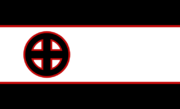GSVP (Deutscher Bund)
Germanic Folk's Socialist Party / Germanic Socialist Folk's Party Germanische Sozialistische Völkische Partei | |
|---|---|
A variant of the Solar cross was adopted as the symbol of the GSVP. It continues to be used by white supremacist groups. | |
| Abbreviation | GSVP (German) GFSP (English) |
| Commissioner | Nikolaus Schroeder |
| Founder | Nikolaus Schroeder |
| Founded | April 9, 1922 |
| Banned | September 11, 1948 |
| Succeeded by | German Volksparty (de-facto) |
| Headquarters | Nuremberg, Bavaria |
| Newspaper | The Folk's Storm |
| Youth wing | The Youth of Germania |
| Membership (1946) | 9.2 million |
| Ideology | |
| Political position | Far-right, Occultist |
| Religion | Armanism |
| Colors | Red, Black, White |
| Slogan | "Wenn es eine Zukunft gibt, dann für die arische Rasse." (German) "If there is a future, it is for the Aryan race." |
| Anthem | Arierlied |
| Party flag | |
 | |
The Germanic Folk's Socialist Party, or the Germanic Socialist Folkist's Party (GFSP, or GSFP, (German: Germanische Sozialistische Völkische Partei; GSVP), was a far-right Pan-Germanic and Ariosophic political party founded and operating in the former German Federation from 1922 to 1948. It was the ruling party of the German Folksreich; during its rule, it united most of Germanic Europe whilst exterminating Jews, Romani, and other groups it considered undesirable. Operating under a strict form of racial purity, the GSVP advocated for a return to the Germanic paganism before the Christianisation of the Germanic peoples.
Originating out of a combination of the Pan-Germanic Folkist movement and Ariosophy, the GSVP was for most of its existence a minor party in the former German Federation- it was among the most extreme parties of the time, shunning even the far-right as "reactionary". Principally, the GSVP believed in uniting all Germanic people into a singular nation, (The English were to be excluded from this state, as it was believed that the English were too 'un-German' to be incorporated) the corporatization of the economy via large state-owned corporations, and the extermination of all undesirables from Europe. Christians were tolerated as they made up a majority of the population of Europe, but officially the GSVP required that all of its inner members practice Armanism.
The rapid rise of power to the GSVP originated in the collapse of the South and North German Federations as well as the increased pressure on the Rhineland from the entente as well as the global market crash in 1930; it formed a coalition government initially with less radical Folkist parties however after securing a clear majority took power over the North German Federation completely; electoral manipulation in the south resulted in the unification of the North and South (excluding Austria, which remained independent until 1940).